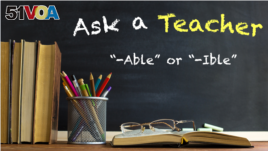23 December 2022
Hello! This week on Ask a Teacher, we will answer a question about how to use "-able" and "-ible" suffixes.
Question
Hello teacher!

Ask a Teacher: "-Able" or "-Ible"
I am Md. Abdur Rahman from Bangladesh. I am a student and have been learning English for a long time. To improve my listening and speaking skills every night I listen to the VOA English podcast. However, I am not good at English spelling mainly when I write sentences. I feel confused over suffixes like "-able" vs "-ible." How can I be an expert in English spelling?
Please help me and share your valuable suggestions.
Sincerely yours,
Md. Abdur Rahman.
Answer
Thank you, Abdur Rahman for writing to us. English spelling is difficult even for native speakers. The English writing system is old, and it does not match up with how we pronounce things now.
But there are "rules" and methods we can use that might help improve our spelling ability.
We add the suffixes "-able" and "-ible" to the ends of words to create an adjective meaning "able to," for example, "fixable."
I broke the coffee pot. Do you think it's fixable?
We pronounce both endings with a "schwa." It is used in expressing unstressed central vowels, like in the word visible.
If you drive out to the countryside, the stars are even more visible!
The ending "-able" is more common because it is considered a "living" suffix. This means that we can create new words with it.
We do not use the suffix "-ible" to make new words because it is used for Latin-based words. And there are no new Latin words, as it is now a dead language with no native speakers.
While there are always exceptions to spelling rules in English, we do have a few rules that can help us figure out which spelling to use.
Let's start with "-able."
"-Able"
We add "-able" to full words, often dropping an "e" in the process.
Adorable is a good example. You start with the word "adore," which means to love or like very much. Now, we drop the "e" from "adore" and put "able" in its place
I saw the most adorable dog on my walk.
In this sentence, adorable could be substituted with "cute."
There are exceptions though, so watch out for words like "available" and "capable." If you take the suffix off, the roots of these words cannot stand alone.
If a word ends in a /k/ or /g/ sound, use "-able," like the word "despicable."
Their favorite movie is "Despicable Me."
Let's move onto "-ible."
"-Ible"
Remember that the number of words with "-ible" will not change because there is a limited number of words from Latin that we use with the suffix. Since it is not a living suffix, we cannot add it to form new words.
Most -ible words cannot stand on their own. They need the suffix to be a word. For example, "possible."
"Poss" is not a word. It needs the suffix "-ible" to be "possible."
But like the suffix "-able," there are exceptions to this rule.
Like the word flexible. "Flex" can be a word on its own.
Remember the spelling rules
For both suffixes you should remember general spelling rules.
One rule is especially notable.
You should drop the "e" on the end of a word when adding a suffix beginning with a vowel.
For example, "likable."
She was very likable in high school.
There is an exception to this rule.
Do not drop the "e" when words end in "ce" or "ge." This has to do with the sounds /g/ or /s/. The letter "e" is needed to keep the consonant sound the same.
For example: Danceable and Changeable
Latin music is so danceable!
The date is changeable for the tickets.
Please let us know if these explanations and examples have helped you!
What question do you have about American English? Send us an email at learningenglish@voanews.com
And that's Ask a Teacher.
I'm Faith Pirlo.
Faith Pirlo wrote this lesson for VOA Learning English.
_____
Words in This Story
pronounce — v. to make the sound of (a word or letter) with your voice
unstressed – adj. not having an accent
vowel — n. speech sounds made with your mouth open and your tongue in the middle of your mouth not touching your teeth, lips, etc.
visible — adj. capable of being seen
odds — n. the possibility that something will happen
cute — adj. having a pleasing, youthful appearance
despicable — adj. very bad or unpleasant: deserving to be despised
flexible — adj. willing to change or to try different things
consonants — n. a speech sound (such as /p/, /d/, or /s/) that is made by partly or completely stopping the flow of air breathed out from the mouth











